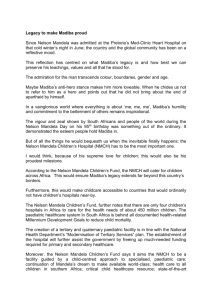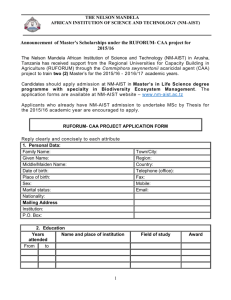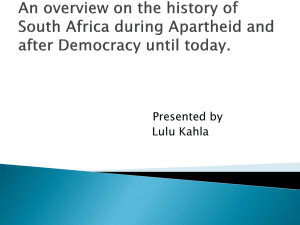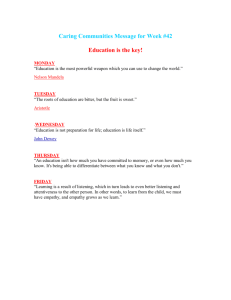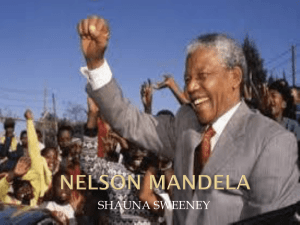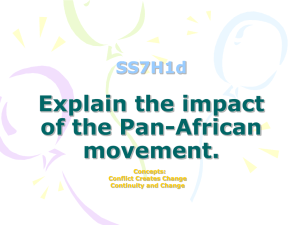Celebrating the Life of Nelson Mandela
advertisement
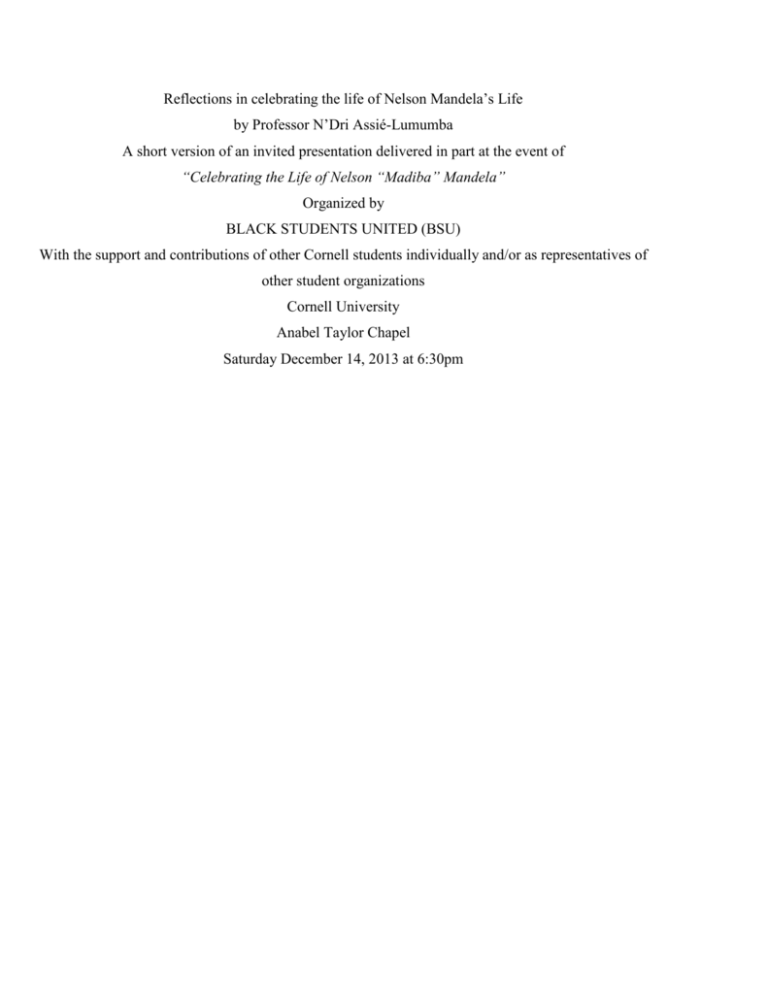
Reflections in celebrating the life of Nelson Mandela’s Life by Professor N’Dri Assié-Lumumba A short version of an invited presentation delivered in part at the event of “Celebrating the Life of Nelson “Madiba” Mandela” Organized by BLACK STUDENTS UNITED (BSU) With the support and contributions of other Cornell students individually and/or as representatives of other student organizations Cornell University Anabel Taylor Chapel Saturday December 14, 2013 at 6:30pm President Skorton, Vice President Murphy, Reverend Clarke, colleagues, members of the Cornell and Ithaca Community: I am very much honored to say a few words on this solemn occasion. I want to express my profound gratitude to you, the students, especially BSU, for the leadership in this call: “In light of Nelson Mandela's passing, come to celebrate the life of Nelson “Madiba” Mandela.” I thank you for your individual roles and your collective presence. I would like to start by recalling the roles that many members of the Cornell Community, in different capacities, played in the movement to dismantle the apartheid system. Of particular significance was the role of the Africana Studies and Research Center at Cornell, its faculty and students for their leadership in campus activism for divestment. Many of these people are still on campus. I would like to mention the roles of the founding director of the Africana Studies and Research Center, Professor James Turner as well as Professor Locksley Edmondson and his role in TransAfrica. It is worth noting that a South African, the late Congress Mbata (co-founder of the Youth League of the African National Congress), who became a target of the brutal regime and was forced into exile in the United States became a founding member of the faculty of the Africana Studies and Research Center. Using scholarship, facts and analyses the members of the Cornell community who were involved in various actions and organizations wanted to explain to the Administration and to the US government and the world the reasons why it was morally reprehensible to do business with the those endorsing apartheid regime. I would like to mention in passing that on the African continent, the struggle against the apartheid system was one of the most remarkable and unanimous grounds of unity. There is no unanimity among scholars and the overwhelming majority of South Africans who suffered discrimination, injustice, dispossession and abject poverty under the apartheid about the achievements of post-apartheid period. Thus, we should remember that the factors that forced Madiba to spend decades in prison have not yet been fully eradicated. There is no unanimity about the actual achievements since he was released from prison. However, given the circumstances, for this event today, I 2 would like to focus my remarks on the celebration of his life. First, I would like to share with you a sample of my messages sent to brothers and sisters and colleagues on different networks, as I express different dimensions of the reactions to the announcement of the passing of Madiba: Message # 1: “Dear Brother and Sister: Although it was a bit late in Tshwane (African name for Pretoria) when we heard the News, I tried to reach you to talk briefly and set up time to talk more with you. Madiba has made his contributions to this world, no matter how differently they are appreciated. We need the connection to be part of the Celebration of the life of an African with a special human experience and reflect on the significance and values of his journey on Earth. We share the feeling of sorrow. He was once a nurtured baby who came from the world of the Ancestors. May the same Ancestors welcome him back with love and in full Glory and May the Almighty grant him Perfect Peace.” Message # 2: “In this situation, I prefer to use the encompassing word Yako, a term in my language, Akan/Twi, to express to you and to all of us the human family in connection with our environment my feelings of sorrow, pain, emptiness in mourning our beloved Madiba and yet the strong sense of connectedness, inspiration, pride and hope in celebration of his life and his legacy.” Message # 3: “I feel the same pain and the sense of emptiness. On Wednesday, commenting on the project of one of my students on the Bantu Education Act, I talked about Nelson Mandela's commitment and vision for education. Perhaps we have nurtured the impossible dream that he would be spared of the inevitability of the human life cycle and be with us longer or forever. Amidst the sorrow, however, I am also referring to an Akan proverb that when a “good person” passes on, His/Her Name becomes a common heritage that is shared by all. That is to say that we can all find not only the obvious values in his life but specific dimensions that make us feel in special ways that we have been enriched from global to our own little spaces. Each person can find ways, and also collectively people can even feel compelled, to manage the precious heritage. This is the case with the physical departure of Madiba. Thus, I would submit, in French, that Nelson Mandela nous interpelelle (Madiba challenges us), to move 3 quickly beyond the pain and celebrate this exceptional life and feel empowered to pursue in our respective capacities his work for building a better world.” Message # 4: “It is just amazing how your specific account of the chain of reaction is emblematic of how so many other people, including brothers and sisters, friends and colleagues in South Africa, have reacted. Even his departure brings this extraordinary unity in our emotions, an expression of the essence of our common humanity to which he dedicated his life.” Now I would like to say a few words about aspects of the life of Nelson Mandela, a human being with human needs who was for so long denied the right to live as an individual with human aspiration such as exercising his profession as lawyer after completing his education, as husband, as a father, as a son. Nelson Mandela Stated: “I am not a saint, unless you think of a saint as a sinner who keeps on trying.” This is an expression of his humility. There are also other dimensions of his normal human needs that are imbedded in his assertion that he is a regular human being. Nelson Mandela spent much of his prime adult life without the ability to live a “normal” life on his own terms. While we tend to refer to the 27 years in prison, we must remember that many years before the prison sentence, he did not have a normal life, especially after he went underground. The real life without freedom spanned over three full decades and denied him the right to live: -As a person: He deeply valued education and was proud of his educational attainment. Indeed, he had an education that was the basis for his aspirations to exercise his profession and to live a normal life, which was denied to him and his people. - As a husband: He started his first marriage as a model husband, a partner in caring for the first children. The failure of this first marriage was the direct result of his intensified commitment to the struggle, when out of frustration Evelyn left with the children. The experience in the second marriage with Winnie was even more difficult as they never enjoyed normal life of a couple. They were never given a chance even after they managed to have two children born in 1958 and 1960, respectively. Thus, Winnie appropriately stated: “ I am the most unmarried of married women.” 4 -As a father: From a model father in the beginning of his first marriage, his dedication to the collective cause became incompatible with a normal life. His children were denied the joy of seeing, and growing up with, their father. He was denied the responsibility and right of contributing directly to raising his children and enjoying their presence in his life. Even when in his first son died of a car accident while he was already in prison, he was not allowed to attend the funerals. -As a son: His mother, holding hand with Winnie, attended the Rivonia trial. She could come only so often to seen him in prison. She passed away while he was still in prison. He recalled the sorrow when he saw her the last time, leaving after she visited him in the prison, and had the feeling that he might not see her again. When Mandela was freed from prison in 1990, I was a visiting assistant professor at Vassar College (Poughkeepsie, New York). In an event to celebrate the “Liberation of Nelson Mandela” I was asked to give the keynote address, which I titled: “Education: an Instrument for Social Control or an Agent for Liberation?” In relation to education, I would like to mention the roles of students (many of your age) but many others who were even younger. One of the most infamous events in the apartheid system involved the indiscriminate crushing of secondary and even elementary school children: The Soweto Uprising, which was part of a series of protests held by young students. On 16 June 1976 high school students throughout SOWETO rose against the imposition of Afrikaans as a medium of instruction in the schools. For them it was a strategy of control and subjugation, aiming to make them have a parochial experience that would provide inferior education and cut them off from the rest of the world. It is estimated that 20,000 students took part in this specific protest of June 16, 1976. The brutal apartheid regime opened fired and killed many of the young people. The estimated number of youth massacred varies between 176 and 700. This was one of the turning points in the global outrage and the intensification of the struggle to dismantle this brutal system. This event was a turning point in the intensification of the struggle in South Africa, across the African continent, and many parts of the globe. In South Africa, the Youth Day on June 16 is now held annually in commemoration of the death these young students. In spite, or even because, of this demonstration of 5 unlimited cruelty of the system, the movement among the students and the youth in general continued until Nelson Mandela came out of prison. One of his first messages in 1990 was to urge the youth to return to school and be educated. Education is not only a process through which technical competence can be acquired to actualize professional plans. More important, education, which was used by the apartheid system as a tool for control, is also an instrument of liberation that was used by many including Nelson Mandela and the students to strategize and organize for the struggle. Regarding the role of the youth, on this occasion Madiba would appreciate that we also remember so many others, such as Steve Biko, a student leader and founder of the Black Consciousness Movement aimed at empowering and mobilizing African people and very popular among the urban youth. A year after the Soweto massacre, in 1977 he died in police custody. I would like to say a few words about Winnie Madikizela Mandela. Whatever the controversies about aspects of Winnie’s actions, historical facts are clear on one matter: you can’t talk about Nelson without talking about Winnie: Read her book Part of my Soul Went with Him. When Nelson received the prison sentence, Winnie was only a 24-year-old young woman, mother of two young children, having to manage the dayto-day life in a brutal regime. In spite of the support of the community, these were trying long years. Furthermore, she became quickly a very articulate young woman fighting on many grounds (for her beloved husband, father of the young children). Beyond the personal aspects, she was fighting for the broader cause for which Nelson was in prison. She was contributing to the battle, ensuring that those who were in prison would not be forgotten. She was fearless with a powerful voice that they wanted to silence but were unsuccessful in achieving. She became a direct target of the brutal system. She suffered indignities, isolation and torture as she was sentenced to internal exile and was deliberately sent to the isolated rural hamlet of Brandfort. The long separation led to an unsustainable marriage after three decades of separation. But the unfailing commitment of Winnie contributed significantly to keeping the message and struggle alive during the long years of the prison experience of Nelson and the other prisoners. 6 Concluding remarks: In our celebration, we must remember that although he lived a life of hardship for a cause he also enjoyed good life: We must remember the smile, the laughter, and the expression of joy. Let us remember Madiba, without apology and with dignity and elegance, expressing a human emotion and reaffirming an important dimension of the African culture: dance. He has been referred to as the dancing President. Often, when dancing with a smile, he had the Black Power sign, a reminder of the continuing struggle, not only for Blacks/Africans, but also for the global world. We are here today to express our sorrow and at the same time salute the actions of a great man. Also, like the Akan proverb states, we are here because we have inherited at least something about his thoughts and actions. He represents a world vision of equality that, if appropriately actualized in transformative policies, would make everyone in every community in South Africa, the African continent and the world enjoy human dignity and rights. Let us take seriously what we have inherited. As we celebrate Maida’s life, we must also remember that his work must continue through our daily lives, through our grand ideas and actions in every social space on the global scale and in our immediate surroundings toward creating and sustaining a world of peace, justice and equality. Thank you for your attention. 7


